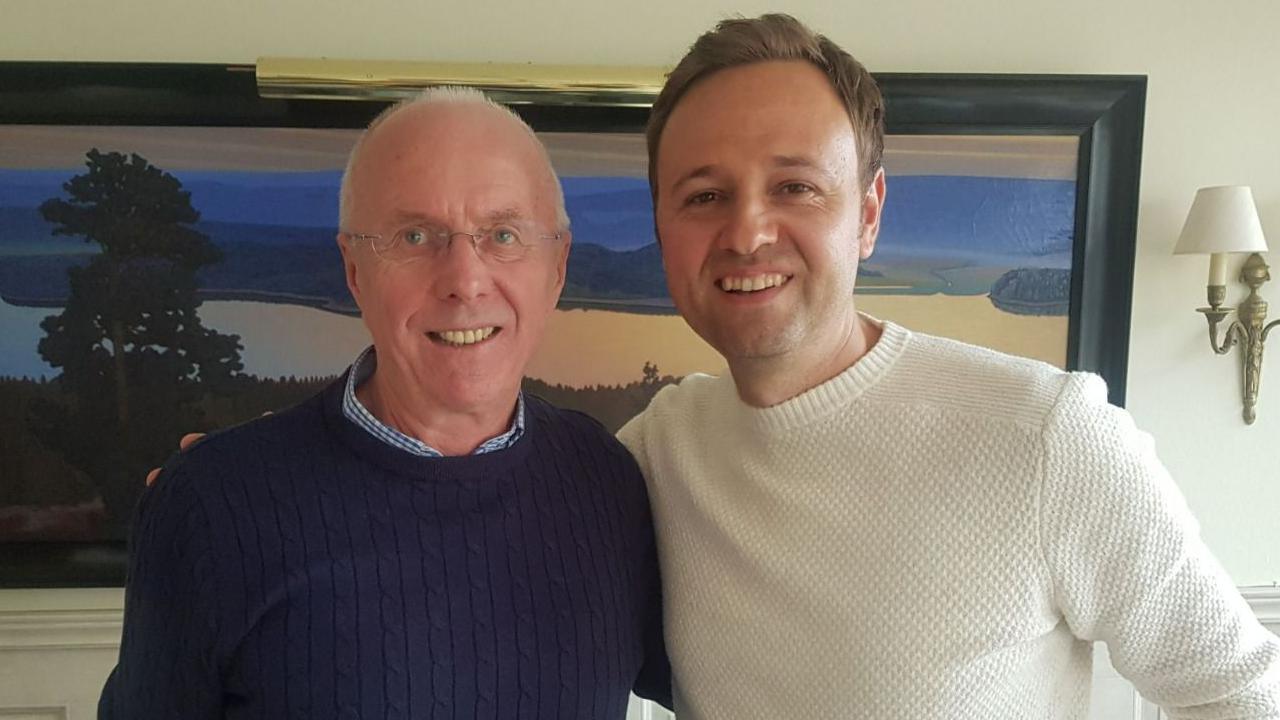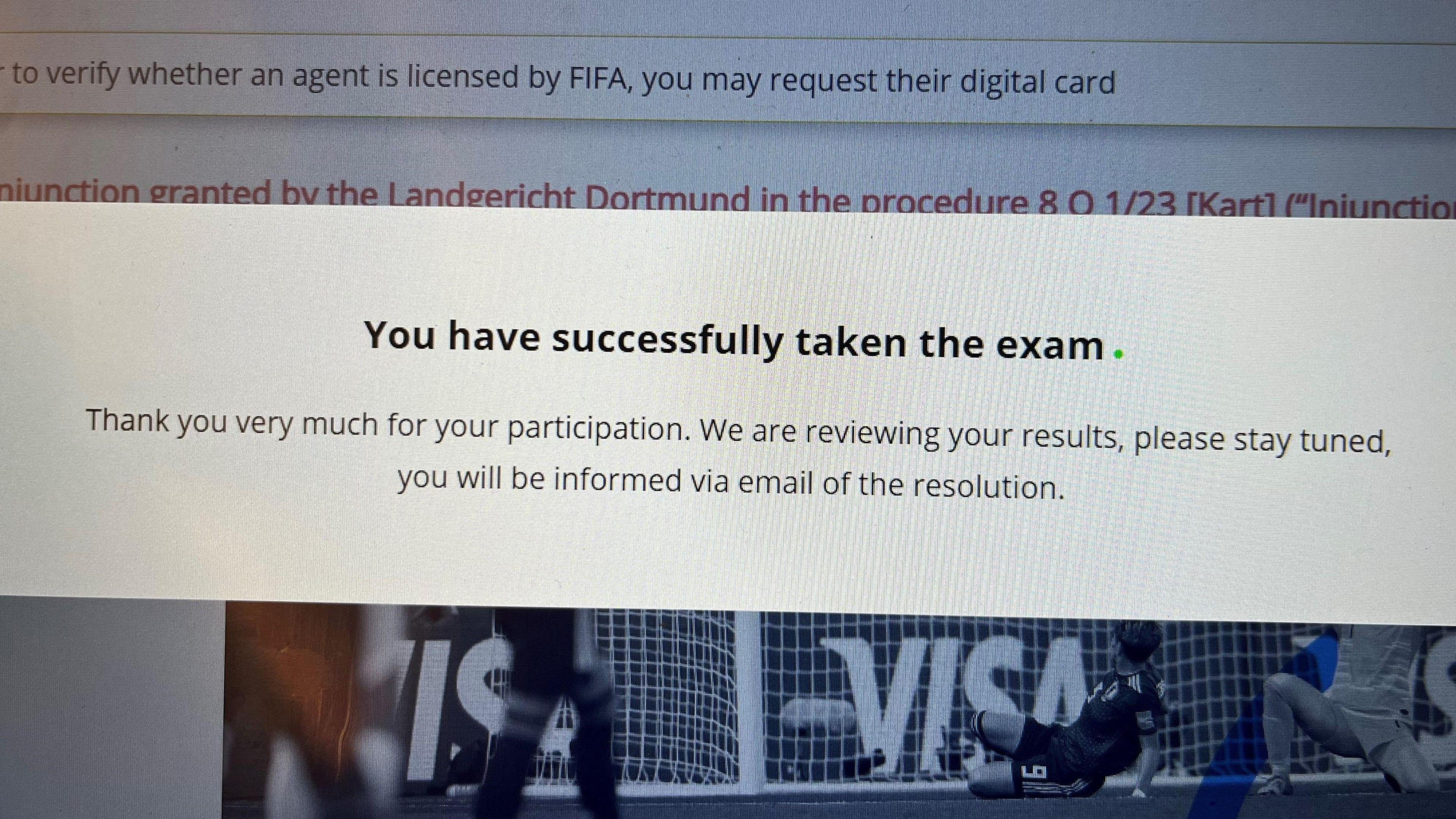How to become a football agent

- Published
"Wembley is a lovely stadium. It's a lovely stadium to have a meltdown at."
Lewis Brownhill - the older brother of Burnley midfielder Josh - is one of about 5,000 candidates worldwide preparing to sit Fifa's exam to become a licensed football agent.
Brownhill, 37, is a chief technician in the RAF, with three tours of Afghanistan during almost 20 years of service.
He also works as a scout for the Cassius Sports agency, which represents his brother along with Alex Oxlade-Chamberlain and Northern Ireland manager Michael O'Neill.
"I feel more nervous, genuinely, than going to Afghanistan," Brownhill says.
"I had set my goal to be an agent. I always put a bit of pressure on myself to pass exams but because it was the next stage of my career I had to make sure I was able to do it.
"It doesn't help that the exam has had such a low pass rate, that's where the pressure comes from."
But can anyone become an agent? Why? How does it work?
I attempted to find out by sitting Fifa's agent exam...
Back to the beginning

The Great Hall at Wembley hosted the Fifa exam in November
It's 8.30am on a cold November day in north London and we are shuffling up an escalator towards the Great Hall at Wembley Stadium to take a seat at one of 300 desks lined up in classic school exam style.
There are two pieces of paper and a pen on each desk.
We will face 20 multiple-choice questions in one nerve-wracking hour on everything from sell-on clauses to when agents can approach minors. You need to answer at least 75% (15 questions) correctly to pass.
The £300 entry fee at least gets you a bottle of water, accompanied by a shiver of GCSE dread from decades past.
But it also gives you a shot at the career of a lifetime as a Fifa-licensed agent in the glamorous world of professional football.
There are approximately 7,000 licensed agents worldwide, and during next month's January transfer window I'll be speaking to many of them - good and bad - to work out which players are going where.
Some are understandably driven by their own agendas - the best interests for their clients and their agency.
Former Manchester United manager Sir Alex Ferguson had an outspoken distaste for some agents, describing them as having an "imagination beyond belief" during negotiations over transfers, new contracts or pay rises.
"You get agents who buy [players'] groceries, do their travel, polish their boots," he said in 2011. "That is the kind of human being you are having to deal with. Some dominate their lives."
Premier League clubs spent more than £400m on agent fees in the year to February 2024, which can conjure up the caricature of a larger-than-life 'super agent' such as the late Mino Raiola.
A far more realistic description of an agent is the well-travelled former EFL player who has years of real-life experience, which they then pass on to their clients.
There are also parents or close relatives looking to represent family members themselves - which some within the industry are critical of.
Why reintroduce the agent exam?
"There have been a lot of players damaged by not having proper agents - chancers who were able to just fill a form in, pay the money and the next day they're an agent," one agent tells me, speaking anonymously.
"I went for a few players and they said they weren't going to sign for me, but wanted to sign with their uncle's friend, next-door neighbour or dad's mate."
Between 2015 and 2023, when the industry was deregulated by Fifa, anyone in England without a criminal record could pay £500 plus VAT to the Football Association, sign a form and become an agent, even with zero industry experience.
Many view the previous lack of control as having flooded the market with unqualified people. Even Fifa recognises it was a mistake.
The exam was reintroduced last year - having been in place between 2001 and 2015 through member associations - when the sport's governing body made it mandatory for all agents to be licensed by 1 October 2023.
Almost half of the 3,800 people who sat the exam in April 2023 failed.
The new Fifa licence is designed to boost standards and "raise the professional and ethical standards of the profession".
From October last year, unlicensed agents were not allowed to work on transfers, contract negotiations or speak to players - although there are about 900 'legacy' agents registered before 2015 who do not have to take the exam.

Agent Dean Eldredge with the late Sven-Goran Eriksson, one of his former clients
"There is that perception, maybe from the outside and unfounded in many cases, that anyone can be an agent," says Dean Eldredge, who runs Oporto Sports.
Eldredge deals exclusively with managers and coaches, working with Sven-Goran Eriksson before his death in August, and passed the first exam in April 2023.
Oporto has 15 coaches and managers on its books including former Leicester and Bristol City boss Nigel Pearson, Barnsley's Darrell Clarke, Rotherham's Steve Evans and ex-Lincoln and Blackburn chief Michael Appleton.
"It's an easy narrative to say 'oh, there's a lot of money being lost to the game because it's going to agents'," Eldredge says.
"Well, if the agents are good and the agency is well run then they're essential to support that individual.
"While the exam is a positive step for the industry, it was far less relevant for me.
"I might be one of very few who specialise in working with managers so that could be something they could look at."
The exam may not correct everything but it is the first step in having the minimum knowledge about the international transfer system, how it works, how a player can be registered with clubs or how to represent minors.
The exam is broadly welcomed, despite some criticism of the questions. It is estimated to have cut the amount of agents by over half.
Fifa accepts the questions bear little relation to an agent's daily responsibility - and they are not supposed to. Fifa regulates the international transfer system and not the day-to-day care of players, so the exam focuses on knowledge of the market, not the human being.
"If it limits the number of bad agents in the game then it's good. It shouldn't be a given you could just go in and work in football," says former Walsall and Doncaster defender Jimmy O'Connor, who has joined Wasserman.
It is one of the biggest agencies in the world, with clients including Chelsea head coach Enzo Maresca, Manchester City and England defender John Stones, Liverpool's Curtis Jones and Newcastle's Harvey Barnes.
O'Connor is sitting the exam on his 40th birthday, after a 15-year playing career which started as a trainee at Aston Villa and finished at Kidderminster.
Former Bristol City and Norwich striker Aaron Wilbraham - who passed his exam last year - is at Murdock Sports Group, headed by former Preston and Northern Ireland defender Colin Murdock.
"I had bad experiences," said Wilbraham, who played for 10 clubs and retired aged 40 in 2020.
"I remember my first agent saying 'it doesn't matter who your agent is, if you do it on the pitch you'll get your moves'. That's not the case.
"Everything else off the pitch needs to be taken care of so you can concentrate on the football.
"If you are doing well you need someone in the background bringing attention to it, spinning plates and getting interest.
"The player has someone to call when something's gone wrong and may not want to ring his dad, who may be a builder and doesn't know what to do next.
"They have someone who knows football."

Burnley forward Jay Rodriguez's father Kiko was trying to pass his exam at the second attempt
Back to the day of the exam, and at breakfast in the Wembley hotel, Kiko Rodriguez - father of Burnley striker Jay - is also a bag of nerves. He works for Stoke-based Beswicks Sports and had been revising hard the night before.
He confesses he finds the process more stressful than watching Jay earn an England cap at Wembley against Chile in 2013.
While Brownhill - who has clearly put the work in - tests me with some last-minute questions, another candidate sits down: the former Blackpool, Burnley, Preston and Oldham winger David Eyres, who has been working for Stellar agency for 17 years.
In the exam room, I speak to Brad Abrahams, 50, who until this point has been a senior manager in the construction industry.
Originally from Sydney, he has lived in the UK on and off for the past 24 years and is now based in Stevenage having worked in Asia, India and the Middle East.
Why the change in direction?
His motivation is his son Oliver, 15, who is part of Benfica's academy in London.
"Three years ago, my lad said 'when I make it I don't want to give my money to anyone else, I want you to represent me, dad'," said Abrahams, who is also a goalkeeping coach for non-league side Newport Pagnell.
"It was very typical of my son, he's got a mature head. We've kept him out of the academy system so far and he reminds me on a weekly basis I have to become an agent."
From the exam hall, it is clearly a male-dominated industry.
Less than 10% of today's candidates are women and only 7% of registered agents worldwide are female.
Autumn Brown, 24, works for PR company Outreach Talent Group (OTG), which represents clients in fashion, comedy, entertainment and sport and has recently signed England rugby winger Jess Breach.
OTG plans to branch out into women's football and Brown - who played hockey for England age-group teams - is going in with her eyes open.
"It's definitely intimidating walking into an exam room when less than 10% is female," she says.
"As we've been growing we've had a number of calls with different sports agencies. I've only spoken to men on these sports calls. They immediately assume I'm not familiar with certain athletes or the industry.
"I do understand my value and I'm not someone that is tentative in those situations - so I'm not going to be intimidated."
'Anxiety levels rising' - sitting the exam

The Fifa agent exam lasts 60 minutes and has 20 multiple choice questions
As the exam looms you can sense anxiety levels rising in the room.
A stern notice from the chief invigilator outlines the rules and warns of Fifa disqualifying candidates.
The exam is random. No-one has the same questions, partly to stop anyone briefing those who are going to take it later in the day or in different time zones.
There were 20 cases of cheating across the world in November - including several in Spain, where candidates changed the IP address of the venue's wi-fi, allowing remote access, before changing it back and submitting their answers.
The exam is all on one page and exactly the same format as the mocks. I took about 30 practice tests on Fifa's agent platform but found it repetitive.
One candidate I spoke to took 144 mock exams but failed by a point. The point of the mocks is to ensure your device is compatible and simulate the exam experience, rather than as a full-blown study aid.
I chose to pay £120 for extra, broader questions from a website claiming a 97% pass rate for first-time takers.
The exam itself is 'open', so you are allowed to use the 686-page Fifa document - the study materials - in both hard copy and as a PDF.
I was advised to print it off so arrived with the sections - including the disciplinary code, Fifa statutes and agent regulations - stapled together but struggled to fit them all on the small desk, eventually putting half on the floor.
During my revision, the criticism from most agents about the narrowness of the questions felt valid. For example, one mock exam asked about a document foreword written by Fifa president Gianni Infantino.
When it was real, I had two questions around where agents can operate, one on sell-on clauses, another on parental consent, more on safeguarding and a tough one on worldwide sanctions I later find out I got wrong.
I finished my 20 questions in 30 minutes - leaving another half-hour to check, second-guess, review and submit.
The relief is palpable. A stressful hour is over and everyone filters out.
Afterwards Abrahams offers his assessment: "It comes across as a lot of legalese. It was challenging to get engaged with the content.
"It makes it more difficult to pass the exam and sums up why the pass rate is so low."
This was O'Connor's first exam since his GCSEs in 2001.
"A lot of it is there to possibly trip you up but if it was easy it wouldn't be doing its job," he says.
"It's as nerve-wracking as any games I've played in. The relief is the same as when you've come off at an away game and nicked a 1-0 win."
Despite the criticisms, the morning went smoothly. Far better than the September 2023 exams at the NEC in Birmingham and ExCel centre in London where the wi-fi failed and caused chaos.
"It was the most stressful time of my life," one agent who attended and passed the ExCel exam tells BBC Sport.
"It was a shambles. If you failed then any player who was signed to you could leave, you weren't adhering to the new rules so the agreement was invalid.
"I could have lost my client base [of about 25 players] in one swoop."
'All I care about is my child' - should family be agents?
The Football News Show: Why Nathan Lowe's dad became a football agent
The 2015 deregulation opened the doors to more family members becoming intermediaries and there were plenty at Wembley looking to pass.
Andy Lowe, father of Stoke striker Nathan, was sitting the afternoon exam.
He does not have the desire to represent his son directly himself but says a licence would give him the knowledge, and he plans on advising other parents on their agent choices.
Nathan, on loan at Walsall, is a client of Murdock Sports Group, which counts Napoli's Scott McTominay and Manchester United's Jonny Evans as two of its highest-profile players.
"A trusted adviser is the best description I could have of a good agent," says Andy.
"Someone who is aligned with your child's goals and aspirations and is bringing a unique set of skills to the table which help support them. But that can't be the parent. If you are the parent and the agent it could cause difficulties and challenges.
"I'm doing it because I want to understand and to keep my agents on their toes. I need them to know I know what this is about. All I care about is my child.
"I had to do a lot of research to figure out what made a good agent and why. I'd like that to be more accessible to parents like myself."
One agent, speaking anonymously as part of this piece, was asked whether family members could make good agents and said "some are really unreasonable" which can "hurt boys' careers".
"Clubs don't want to deal with parents because they are too emotionally involved," they added.
However, a sporting director at a top-level club - whose job is dealing with transfers and therefore agents - dismissed suggestions family members cause problems.
He described his negotiations with them as "no more complicated" than those with a traditional agency around transfers or new contracts.
A manager, who played in the Premier League during a 20-year career, accepts agents are necessary, even if they can become problematic whoever they are.
He said: "The longer you are in it, you trust certain ones more than others. Sometimes when there's a disingenuous bit of information, that trust can go.
"It works both ways. If I'm trying to sign a player and a club doesn't want to lose that player, the agent provides the buffer to discuss what the likelihood of a deal may be.
"There will be times that relationship can become frayed and you know if you remove the middle man things will be easier.
"But from a player's perspective it's worthwhile having that separation from the finances and negotiations."
Pass or fail? The verdict...
An email from Fifa dropped a week later. It read "congratulations" and asked for more money to complete the application process.
If you pass, you are not told what mark you got. Only those who fail are informed of which questions they got wrong.
A text from Brownhill arrives. "I passed my exam" and a flame emoji.
Birthday boy O'Connor has passed too. I am later told the two exams this year had a pass rate of just 40%.
What now then? While I have a Fifa licence and am officially an agent, it does not necessarily make me one.
It is like passing your driving test. You are legally allowed to drive a car but do you know the roads? What do you do on the motorway, how do you navigate other road users or obstacles?
It is the same in agency. What do I know about negotiating contracts, handling transfer requests for unhappy players or doing multi-million pound deals?
Yet, now I have passed, the licence is indefinite as long as I comply with regulations, make sure my admin is up to date - including continued professional development courses like anti-trafficking and Fifa agent regulations - and keep paying almost £500 a year to operate worldwide.
In the stands and in the bars, pre and post-match, the profession may be misunderstood. Agents are easy targets and there are good and bad operators in every industry.
It is not just a case of pass the exam, find a player and make millions. Some - perhaps even a few of those who were in the room at Wembley with me - will still undoubtedly think that.
The exam was the easy part.